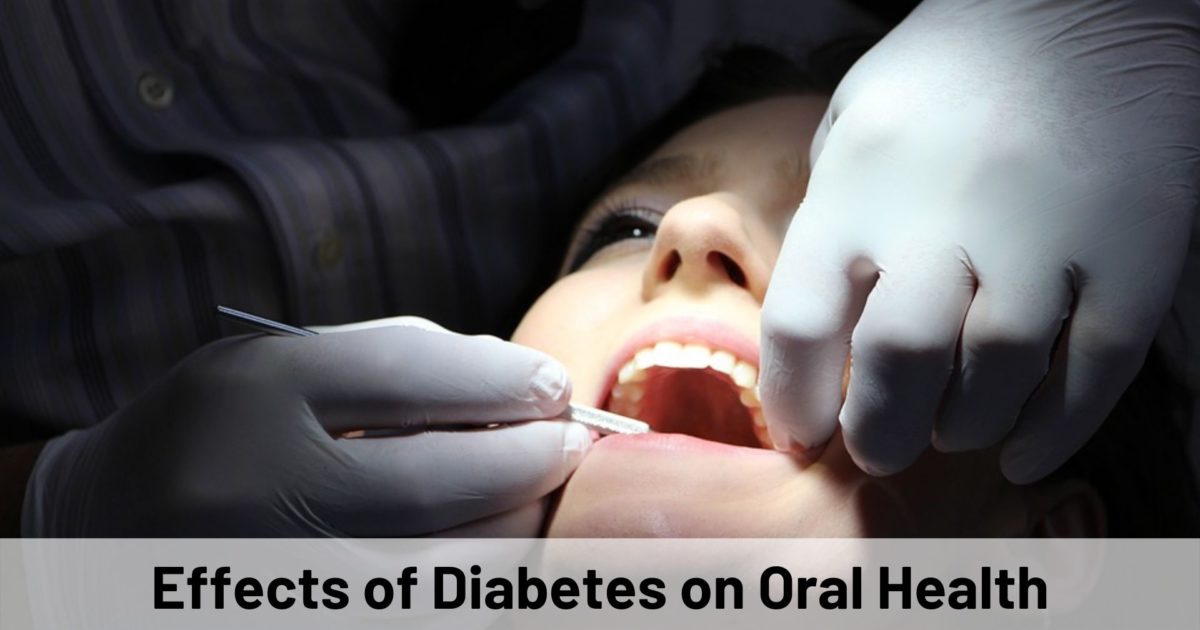Diabetes affects over 3 million people in the UK and can cause several serious health complications including cardiovascular disease and nerve damage, but one of the complications that are often overlooked is an increased risk of developing gum disease.
Research has increasingly shown a causal link between hypoglycaemia (raised blood sugar levels) and immune suppression, which leaves diabetic patients at risk of developing gum disease if a proper oral health regime is not maintained. Read on to learn more about how diabetes can affect your gum health and how to prevent gum disease.
Diabetes and Periodontal (gum) Disease
Severe gum disease, also known as periodontitis, is an inflammatory condition of the gums that causes significant destruction of the ligaments and bones that support the teeth. This often means that tooth extraction is the only option to save the rest of the teeth.
Patients with diabetes have a higher risk of developing gum disease as the raised sugar levels in the blood provide nutrients for harmful bacteria that cause gum infection. Diabetics also have reduced immune function, which limits the body’s ability to fight the bacterial infection, causing symptoms to progress rapidly and slows down the healing process.
Research suggests that diabetes not only contributes to the development of gum disease, but gum disease can also speed up the progress of diabetes and worsen the symptoms.
Signs of Gum Disease
Addressing gum disease early is vital for preventing periodontitis and can help to minimise the effect of gum disease on your blood sugar. To protect your gums and teeth from bacterial infection, it is essential to look out for the early warning signs of gum disease. Some symptoms include:
- Teeth that appear longer due to the gums pulling back from the teeth
- Loose teeth or changes in the feel of your bite
- White patches or mouth sores which are usually caused by thrush a fungal infection associated with diabetes
- Gums that bleed after brushing or flossing
- A persistent bad taste or bad breath
- Dry mouth due to poor saliva production
- Persistent discharge from the gums
If you notice any of the above symptoms and suffer from diabetes, call your local dentist in Weybridge to make an appointment to discuss a treatment plan to reduce the risk of developing periodontitis.
Risk of Oral Infection in Diabetic Patients
Diabetics suffer from chronic hypoglycaemia, which can cause acidosis in the body and impairs immune function. This means that patients with diabetes are more likely to contract bacterial and viral infections and take longer to heal. This leaves people with diabetes at a higher risk of contracting gum disease and can prolong the severity of the condition if not addressed early.
The risk is even higher in patients who do not have their blood sugar under control, as high blood sugar levels provide the bacteria in the gums with a nutrient-rich environment in which to multiply.
Precautions for Healthy Gums
Preventing gum disease is the best way to ensure good oral health. Here are several ways that you can help to prevent gum disease if you suffer from diabetes.
- Control your blood sugar. The most important step to reducing the risk of gum disease is to take steps to get your blood sugar under control. Consult your doctor about medications and dietary changes that can help keep your blood sugar stable.
- Brush your teeth twice a day with a soft bristle toothbrush and a toothpaste containing fluoride. Also gently brush the gums to stimulate blood flow.
- Floss your teeth at least once a day to remove food particles and tartar from between the teeth.
- Use mouthwash once per day to eliminate harmful bacteria. Be aware that overuse of mouthwash can eliminate good bacteria in the mouth and digestive tract and further reduce immune function in diabetic patients.
- Drink plenty of water throughout the day and chew sugar free gum containing xylitol after meals to stimulate saliva production and prevent dry mouth.
- Quit smoking. Not only is smoking bad for your overall well-being, but studies have shown that it increases the risk of diabetes and harms your oral health contributing to tooth decay, gum disease and in severe cases, mouth cancer.
Importance of Routine Dental Check-ups
Above all, you mustattend regular dental check-ups to monitor how your diabetes is affecting your oral health. These routine visits give you the opportunity to inform your dentist about any changes to your medication that could impact your oral health, and any developments in your conditions that may require special care.
However, if you do not have your blood sugar under control, postpone any dental work unless it is an emergency.
Final Thoughts
If you suffer from diabetes, managing your blood sugar levels is the best way to prevent the onset of any health complications that may arise. To learn more about how to implement an oral health regime, or to speak with a dentist about how diabetes is affecting your oral health, call your local dental clinic to book an appointment.
Banner Image : pixbay




